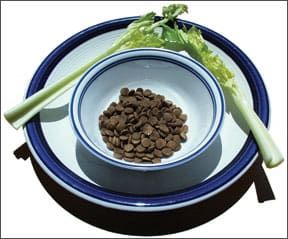Earlier this year the Humane Society of the United States (HSUS) entered the pet food market with its “Humane Choice” brand of organic vegetarian dog food. According to the product’s marketing materials, the impetus for the move was “to give pet guardians an option to feed their dogs a complete and balanced food that is also sustainably grown and helps us in our work to combat inhumane factory farm practices.” Those are some great (and disparate) goals – but is this a good choice for your dog?

288
We don’t think so, for a number of reasons. We’re skeptical about vegetarian diets for dogs; they are anything but biologically appropriate for carnivores. Yes, dogs are carnivores, not herbivores or omnivores, like humans. While they are not obligate carnivores (as cats are), their bodies are designed to process and thrive on animal protein.
It’s true that dogs have versatile digestive systems that are capable of utilizing plant proteins – but it’s also a fact that scientists are still making discoveries about the nutrients that dogs need. For example, it was only in 1997 that veterinary researchers began to realize that a deficiency of taurine, an amino acid found only in animal products such as meat and fish, is linked to dilated cardiomyopathy (DCM). This is a form of heart disease that causes the heart to enlarge and the muscle to become thin and flabby, leading to heart failure and death. Taurine deficiency has also been linked to retinal degeneration in both dogs and cats.
Because dogs are capable of synthesizing taurine from other amino acids (cystine and methionine), it had been assumed that they do not require taurine in their diets. Researchers at the University of Georgia, College of Veterinary Medicine, however, found that dogs can develop taurine deficiency leading to DCM despite the diet including adequate amounts of these taurine precursors. Certain breeds of dogs, including Newfoundlands, Cocker Spaniels, and Golden Retrievers, appear to be more susceptible to the effects of low taurine.
HSUS says that its food “has been formulated to meet the nutritional needs of adult dogs as established by the Association of American Feed Control Officials (AAFCO).” In our opinion, this is not a guarantee that all of your dog’s nutritional needs are being met. Apparently convinced by the taurine studies they’ve seen, many pet food makers have begun supplementing their dog foods with taurine, even though AAFCO has yet to designate taurine an essential amino acid for dogs (as it is for cats).
A study published in the Journal of the American Veterinary Medical Association in 2003 linked dilated cardiomyopathy caused by taurine deficiency in 12 dogs to lamb and rice dog foods that were low in taurine, despite meeting AAFCO requirements (many manufacturers of lamb and rice dog foods now voluntarily add taurine to their foods as a result).
Another study done in 2003 found that dogs fed diets containing rice, rice bran, or barley had lower levels of taurine in their blood. Dr. Quinton Rogers of the University of California at Davis, School of Veterinary Medicine says, “During the past few years, our clinic has seen an increasing number of dogs with low plasma taurine concentrations and clinical signs of cardiomyopathy. The common factor in all cases was their diet history.” According to Dr. Robert Prošek, “pets may develop DCM on taurine deficient diets, such as vegetarian diets.”
L-carnitine is another amino acid found primarily in animal products. It is not considered essential in dogs because they can manufacture their own, yet low levels of carnitine have also been linked to DCM, particularly in Boxers. And DCM is just one of the problems that can be caused by the nutritional deficiencies of a vegetarian diet. A survey done in 1994 of 300 dogs fed a vegetarian diet found a number of health problems, including several deaths. Some of these problems, including heart disease, increased the longer the dogs were fed a vegetarian diet.
We asked the HSUS for a complete nutrient analysis for Humane Choice, and admitted our special interest in the product’s amino acid profile. Had they paid any attention to the issue of taurine and L-carnitine? Unfortunately, we were told that this information is “proprietary” and could not be disclosed. Neither taurine nor L-carnitine is listed among Humane Choice’s ingredients.
In addition to the major issue of the appropriateness of a vegan food for dogs, we have other problems with the product’s concept. We agree that many factory farming practices in this country are outrageous and cruel, and we’d happily throw our support behind any pet food maker who offered a product that contained only certified cruelty-free animal proteins. But the claim that a product that is imported from Uruguay, is sold in small bags, and costs almost $3 a pound is “sustainable” is outrageous. For that price, you could feed your dog healthy local food, including meat from sustainable family farms and ranches, that will truly fulfill your dog’s nutritional needs. – Mary Straus
For more information:
Humane Choice, thehumanechoice.com; (760) 842-1073






